ผู้ผลิตอุปกรณ์วารีบำบัดลำไส้ใหญ่
Key Takeaways
- Colonic irrigation involves flushing the colon with large amounts of water through a tube inserted into the rectum
- Medical experts generally do not recommend colonic irrigation for healthy individuals
- Potential risks include dehydration, electrolyte imbalance, infection, and bowel perforation
- People with certain medical conditions should strictly avoid colonic irrigation
- Consulting with a healthcare professional is essential before considering this procedure
What Is Colonic Irrigation and How Does It Work?
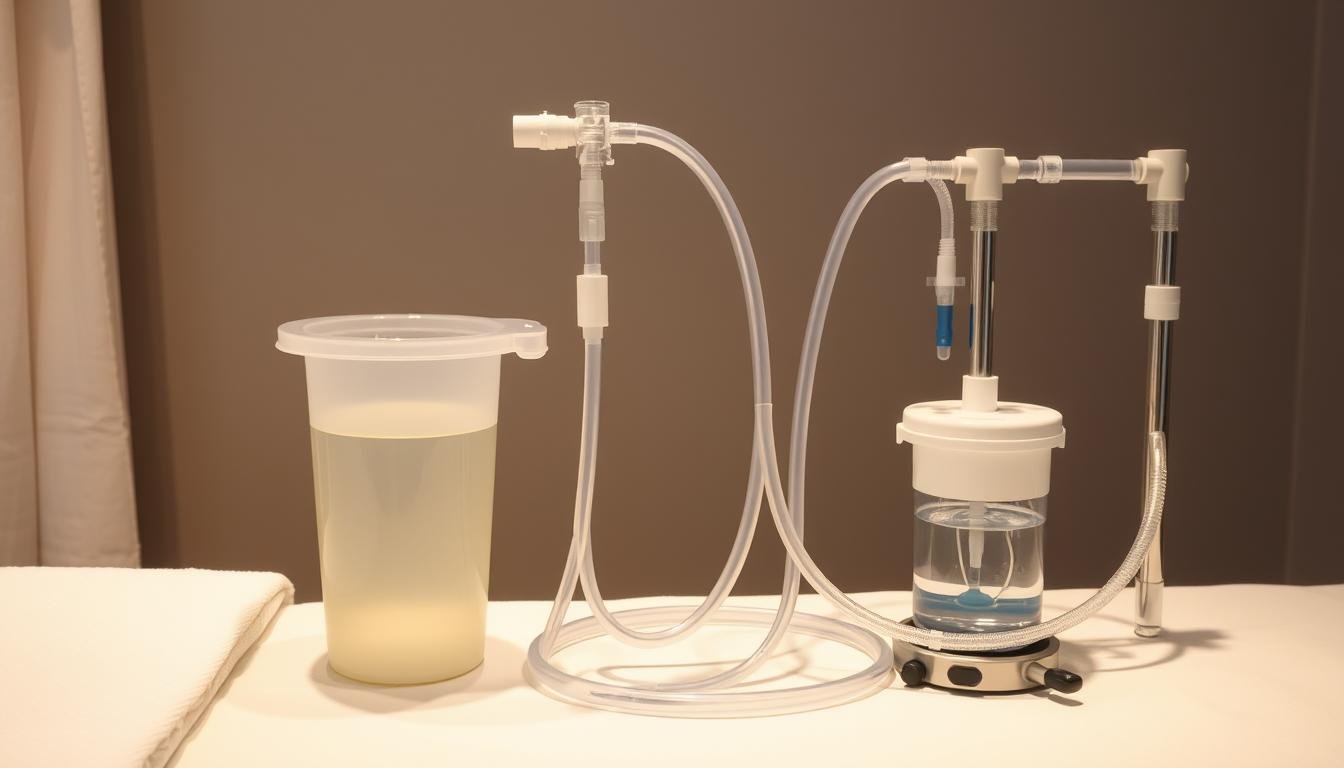
Typical equipment used during a colonic irrigation procedure
Colonic irrigation, also known as colonic hydrotherapy or a colon cleanse, is a procedure where a practitioner inserts a tube into your rectum. Large amounts of water—sometimes mixed with herbs, coffee, or other substances—are then pumped through the tube to flush out your colon.
The procedure typically lasts 30-60 minutes. During this time, water flows into your colon, and waste materials are expelled through a different tube. Practitioners often massage your abdomen to help move the water through your intestines.
Proponents claim this process removes “toxins” and waste that supposedly build up in your colon. However, it’s important to understand that your colon is naturally designed to eliminate waste efficiently without additional intervention.
Common Claims About Colonic Irrigation
- Removes toxins and waste buildup
- Improves digestive function
- Boosts energy levels
- Enhances immune system function
- Promotes weight loss
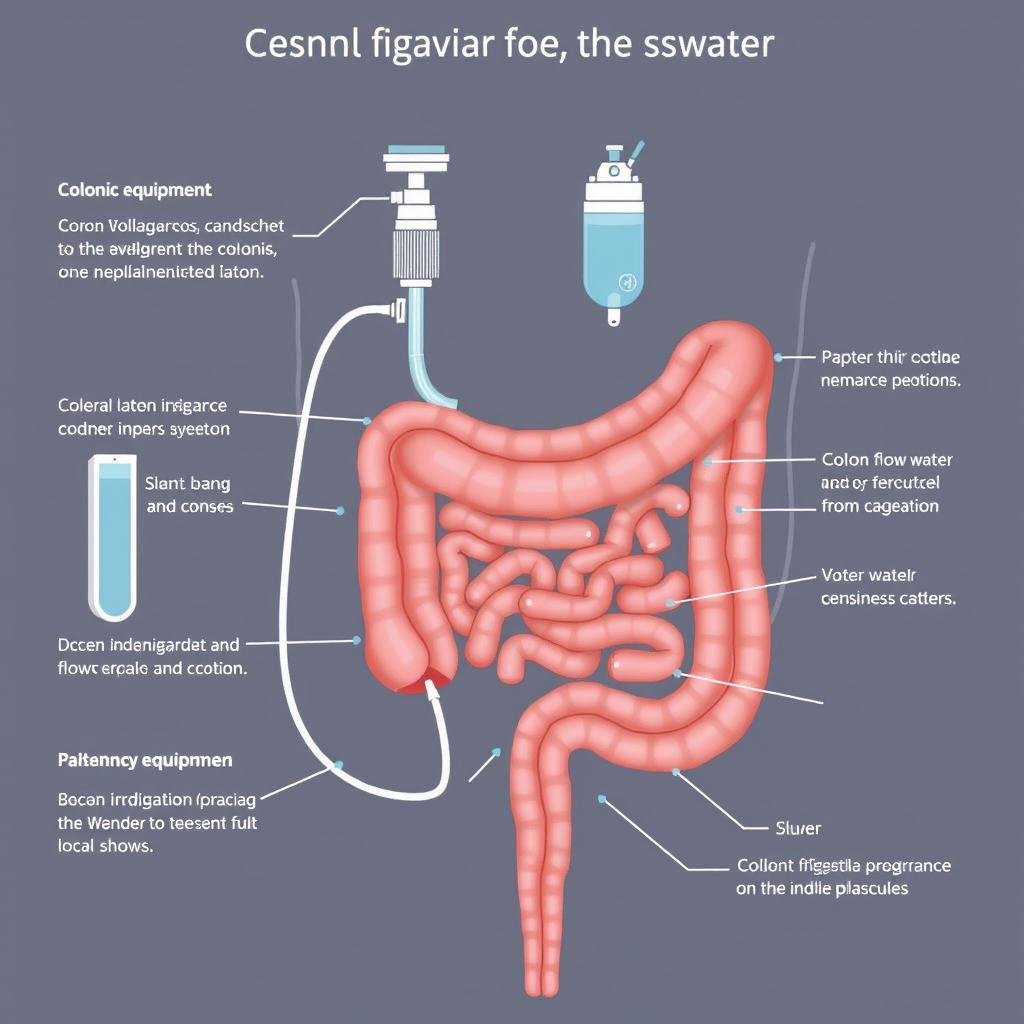
Is Colonic Irrigation Safee? Understanding the Risks
When asking “is colonic irrigation safee-” it’s crucial to understand that medical professionals generally do not recommend this procedure for healthy individuals. The colon is designed to eliminate waste naturally, and interfering with this process can lead to several health concerns.

Potential Risks and Side Effects
Potential Risks of Colonic Irrigation
- Dehydration and electrolyte imbalance: The procedure can disrupt your body’s fluid balance, potentially leading to dehydration and dangerous electrolyte imbalances.
- Bowel perforation: In rare cases, the equipment used can damage or perforate the intestinal wall, which is a serious medical emergency.
- Infection: Improperly sterilized equipment can introduce harmful bacteria into your colon.
- Disruption of gut microbiome: Colonic irrigation can flush out beneficial bacteria that are essential for digestive health.
- Kidney and heart problems: Electrolyte imbalances can affect kidney function and heart rhythm.
Dr. Robert Bresalier, a gastroenterologist at MD Anderson, emphasizes: “Our bodies are equipped to cleanse themselves. The idea that the average person’s colon needs to be cleansed — or that having colonic hydrotherapy offers health benefits — isn’t proven.”
“It’s not something that you need to do to maintain the health of your colon. For some people, colonic hydrotherapy can actually be dangerous.”
Who Should Absolutely Avoid Colonic Irrigation?
Certain medical conditions make colonic irrigation particularly dangerous. If you have any of the following conditions, you should strictly avoid this procedure:
- Diverticulitis – Inflammation of pouches in the digestive tract
- โรคโครห์น – Inflammatory bowel condition
- Ulcerative colitis – Chronic inflammation of the colon
- Recent colon surgery – Risk of disrupting surgical healing
- โรคริดสีดวงทวาร – Can worsen existing hemorrhoids
- Kidney disease – Risk of fluid imbalance
- Heart disease – Electrolyte shifts can affect heart function
- Severe hemorrhoids – Can cause bleeding and pain
- Pregnancy – Risk to mother and baby
- Intestinal tumors – Risk of perforation
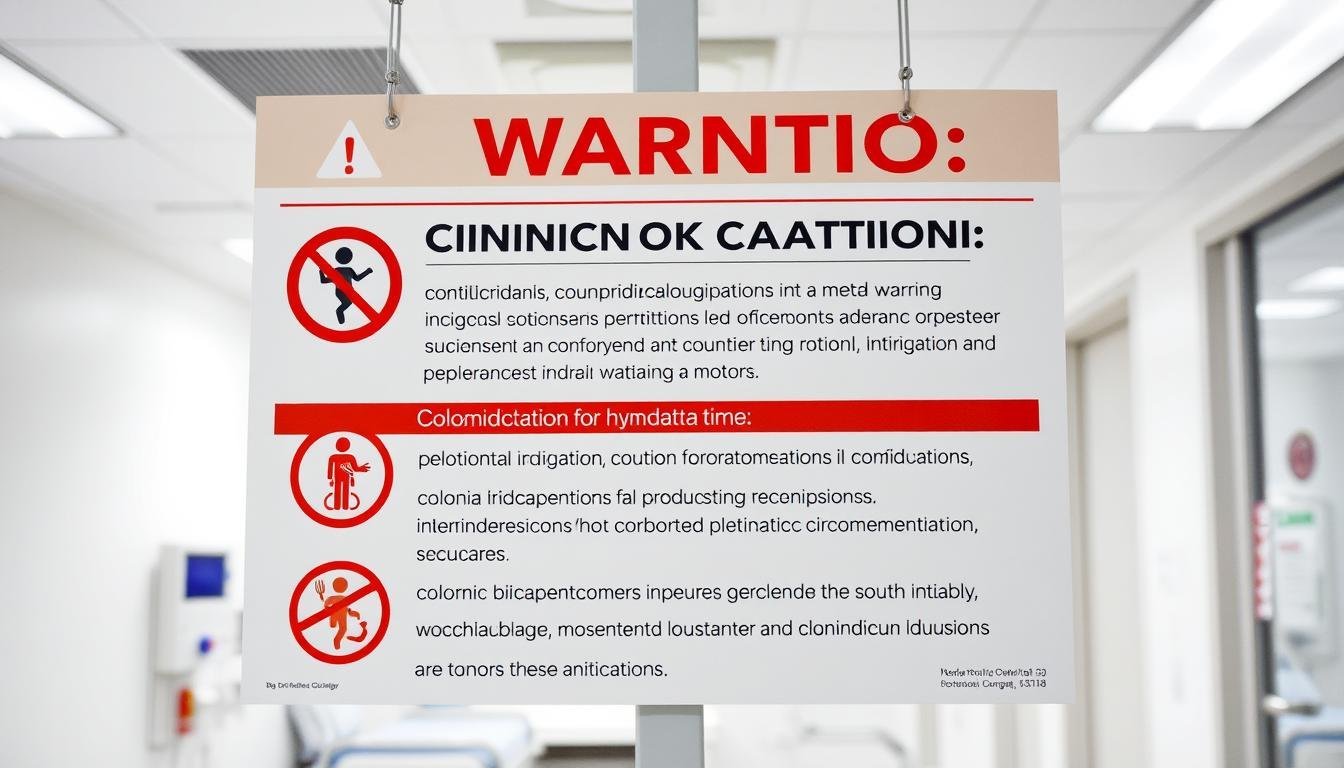
Warning: If you’re experiencing severe, persistent constipation or other digestive issues, it’s important to consult with a healthcare provider rather than seeking out colonic irrigation. Your symptoms could indicate an underlying medical condition that requires proper diagnosis and treatment.
Potential Benefits vs. Long-Term Risks
While proponents claim numerous benefits from colonic irrigation, it’s important to weigh these against the scientific evidence and potential risks.
Claimed Short-Term Benefits
- Temporary relief from bloating and gas
- Feeling of lightness after the procedure
- Potential short-term relief from constipation
- Psychological sense of “cleansing”
Documented Long-Term Risks
- Dependence on artificial cleansing
- Disruption of natural bowel function
- Potential damage to intestinal flora
- Risk of recurring infections
- Possible nutrient absorption issues
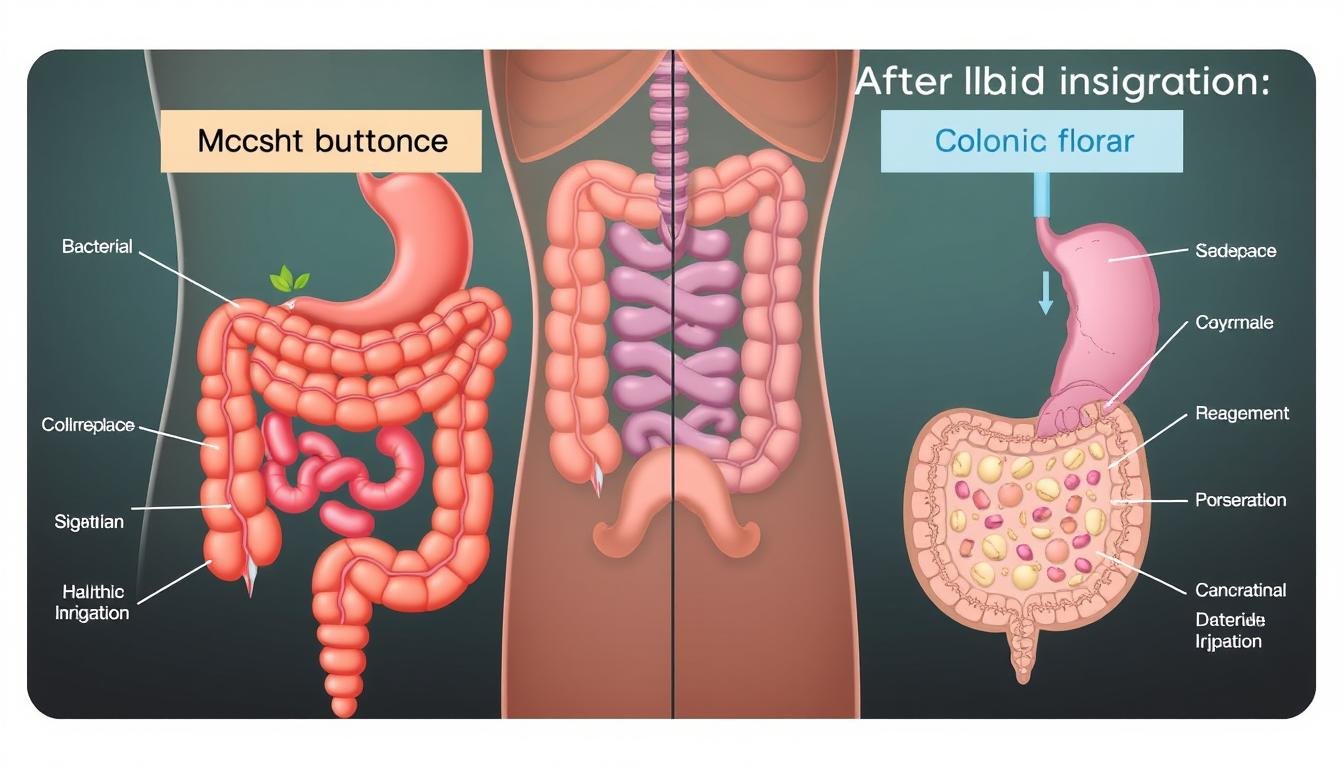
Dr. Craig Reickert, Division Head of Colon and Rectal Surgery at Henry Ford Hospital, states: “While it’s important to pay attention to your gut health, colon cleanses do not offer any medical benefit — and they pose serious health risks. If your colon is functioning normally, it’s regularly removing waste from your body.”
Concerned About Digestive Health?
Instead of colonic irrigation, consider consulting with a gastroenterologist who can provide evidence-based recommendations for your specific situation.
Professional Clinic Procedures vs. DIY Home Kits
Colonic irrigation is available both as a professional service at clinics and as do-it-yourself kits for home use. Each comes with its own set of considerations.
| Aspect | Professional Clinic | DIY Home Kits |
| Equipment Sterility | Usually higher standards, but varies by facility | Depends entirely on user cleaning practices |
| Risk of Injury | Lower with trained practitioners, but still present | Higher due to lack of training and proper technique |
| Water Pressure Control | Usually regulated by professional equipment | Often poorly controlled, increasing perforation risk |
| Medical Oversight | Rarely performed by medical doctors | None |
| Emergency Response | Someone present if complications occur | No immediate help available |
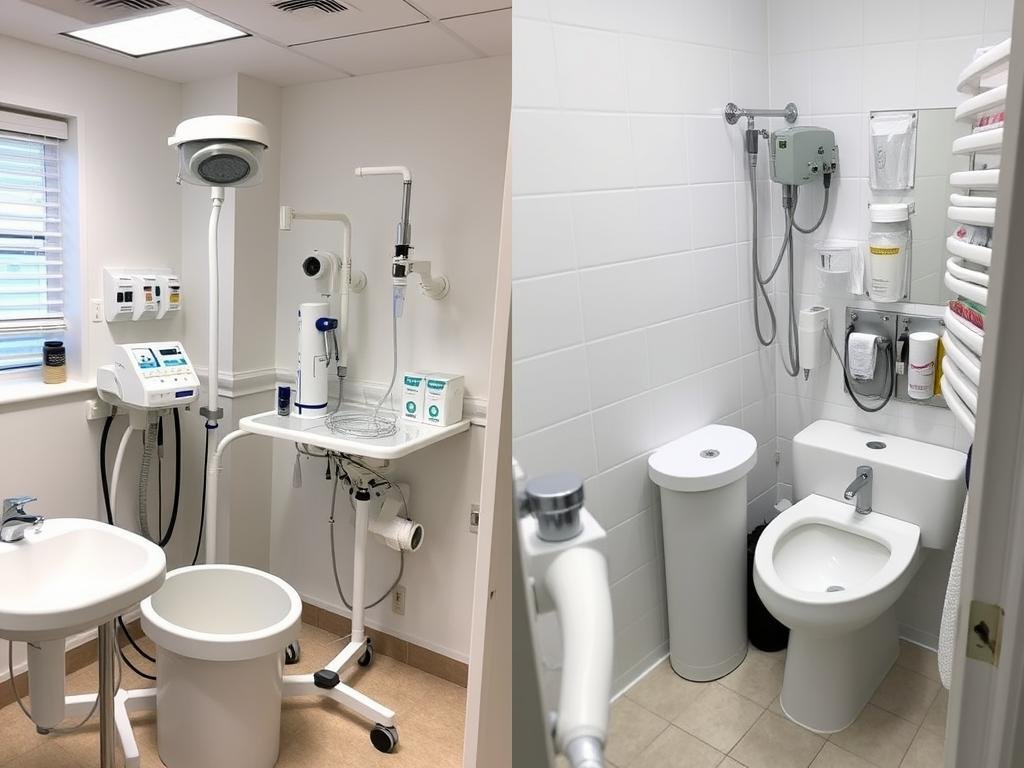
It’s important to note that even in professional settings, colonic irrigation practitioners are rarely medical doctors. Many states and countries have minimal regulation of this practice, and practitioners may have limited training in anatomy and physiology.
Important: If you’re still considering colonic irrigation despite the risks, a professional clinic is generally safer than DIY home kits. However, consulting with a healthcare provider first is strongly recommended regardless of which option you’re considering.
Safer Alternatives for Digestive Health
Instead of asking “is colonic irrigation safee,” consider these evidence-based approaches to maintain digestive health:

Dietary Approaches
- Fiber-rich foods: Aim for 25-30 grams of fiber daily from fruits, vegetables, whole grains, and legumes
- Adequate hydration: Drink plenty of water throughout the day
- Probiotic foods: Yogurt, kefir, sauerkraut, and other fermented foods support gut health
- Limit processed foods: Reduce intake of highly processed foods, which can disrupt digestive function
Lifestyle Practices
- Regular exercise: Physical activity promotes healthy bowel movements
- Stress management: Chronic stress can disrupt digestive function
- Regular bathroom habits: Don’t ignore the urge to have a bowel movement
- Adequate sleep: Poor sleep can affect digestive health
These natural approaches support your body’s inherent ability to maintain digestive health without the risks associated with colonic irrigation.
What Medical Studies and Experts Say

Despite the popularity of colonic irrigation, scientific evidence supporting its use is limited. Major medical organizations, including the American Gastroenterological Association and the American Medical Association, do not endorse colonic irrigation for general health maintenance.
A systematic review published in the Journal of Family Practice concluded that there is no scientific evidence to support the use of colonic irrigation for detoxification or to promote general health. The review also highlighted the potential risks associated with the procedure.
“Maintaining your water balance is really important. If you interfere with your colon’s water absorption, that could throw off your fluid balance.”
The FDA has not approved colonic irrigation devices for routine cleansing or health promotion. These devices are only approved for medical use, such as cleansing the bowel before diagnostic procedures like colonoscopies.
Frequently Asked Questions About Colonic Irrigation Safety
Does colonic irrigation actually detox the body?
There is no scientific evidence supporting the claim that colonic irrigation detoxifies the body. Your liver, kidneys, and colon already efficiently remove waste and toxins without additional intervention. The concept of “toxin buildup” in the colon that requires special cleansing is not supported by medical science.
How often is it safe to do colonic irrigation?
Medical experts generally do not recommend colonic irrigation at all for healthy individuals. Regular use can disrupt normal bowel function and lead to dependence. If you’re experiencing digestive issues, it’s better to consult with a healthcare provider rather than seeking colonic irrigation as a solution.
Who should absolutely avoid colonic irrigation?
People with the following conditions should strictly avoid colonic irrigation:
- Inflammatory bowel diseases (Crohn’s disease, ulcerative colitis)
- Diverticulitis
- Recent bowel or abdominal surgery
- Hemorrhoids or rectal/anal fissures
- Heart or kidney disease
- Severe hemorrhoids
- Pregnancy
- Colon cancer or history of colon polyps
Is colonic irrigation the same as an enema?
No. While both involve introducing water into the colon, they differ significantly. An enema typically uses a small amount of fluid to stimulate bowel movements and only affects the rectum and lower colon. Colonic irrigation uses much larger volumes of water and attempts to cleanse the entire colon. Enemas are sometimes medically necessary, while colonic irrigation is generally not recommended by medical professionals.
Can colonic irrigation help with constipation?
While colonic irrigation might provide temporary relief from constipation, it doesn’t address underlying causes and can actually worsen the problem long-term by creating dependence. For chronic constipation, it’s better to consult with a healthcare provider who can identify and treat the root cause. Dietary changes, increased water intake, and physical activity are safer and more effective long-term solutions.

Conclusion: Is Colonic Irrigation Safee?

When asking “is colonic irrigation safee,” the evidence points to significant risks with minimal proven benefits. Medical experts generally do not recommend this procedure for healthy individuals. Your colon is naturally designed to eliminate waste efficiently without additional intervention.
Instead of seeking colonic irrigation, focus on evidence-based approaches to digestive health: a fiber-rich diet, adequate hydration, regular physical activity, and stress management. These natural approaches support your body’s inherent ability to maintain digestive health without the risks associated with colonic irrigation.
If you’re experiencing digestive issues such as constipation, bloating, or irregular bowel movements, consult with a healthcare provider who can identify and address the underlying causes rather than seeking temporary relief through potentially harmful procedures.
Concerned About Your Digestive Health?
Speak with a healthcare professional who can provide personalized advice based on your specific health needs.
“Remember that it’s normal to have some variation in your bowel schedule. If you have concerns, your doctor can help you develop a safe and effective plan to improve your digestive and overall health.”
